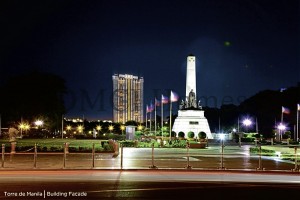
LIKE A SORE THUMB? Taken from the website of a real estate company, this digital depiction of the proposed Torre de Manila condo was presented during the Manila City Council hearings on the contentious project.
The Manila city building officer who faces charges from city councilors following his approval of a 40-story condominium defended his actions amid criticism that the building would mar the view of Rizal Park.
Melvin Balagot said he granted a building permit to the developer DMCI Homes for its Torre de Manila project on July 5 because the company had duly submitted all requirements, including an approval from the city planning office in the form of a zoning permit.
In an interview with the Inquirer Tuesday, he insisted that DMCI was clear of any violations under the national building code and other laws, and therefore had a right to a speedy approval of its application.
“Based on the building code, they have no problems. They complied with all requirements and we couldn’t sit on it. There were no grounds for delay and no reason not to issue a building permit,” Balagot stressed.
Balagot maintained that the proposed site for Torre de Manila was a kilometer away from the Rizal monument and that there were no heritage laws restricting the construction of a high-rise building within that distance.
He also disclosed that DMCI had received a height clearance permit from the Civil Aviation Authority of the Philippines, allowing the construction of the 165-meter-tall building on Taft Avenue, Ermita.
Balagot also denied disrespecting the city council by not attending its public hearings in relation to the project. DMCI officials were also invited to the hearings but did not attend and only sent a letter to the council.
“We sent them a letter requesting that they address their invitation to Manila Mayor Alfredo Lim as a courtesy. We can only go with his clearance,” Balagot explained. He invited the councilors to just see him at his office if they have any questions or requests for documents.
He noted with regret that Torre de Manila, despite having no legal infringements, had come under heavy fire. “They keep saying Manila is being left behind. Now here comes a private developer and they’re attacking it.”
“We’ll face the council’s complaints and we’ll answer them in the proper forum,” he said.
The Manila City Council last week released a committee report alleging that DMCI Homes and city officials acted “in conspiracy” to have the Torre de Manila project approved.
Cultural activist and tour guide Carlos Celdran, who has actively promoted Manila’s historical landmarks, launched an online campaign last month against the project, saying that it would mar the view of the iconic monument of national hero Dr. Jose Rizal at the park also known as Luneta.
Celdran later presented to the council a petition that had gathered more than 4,000 signatories asking DMCI to reconsider its plans.
The committee report alleged that Torre de Manila, based on plans posted on the DMCI website, would violate the city’s zoning ordinance. It recommended the filing of appropriate charges in the Manila Metropolitan Trial Court against Balagot and the company officials.
According to the council, the condominium would exceed the floor area ratio and the maximum height for buildings in that area which is considered a university zone.
In a statement Tuesday, Celdran hailed the council’s move as “a landmark” decision in Manila’s history, but maintained that it should not be taken as an attack on developers but rather as a protective measure serving the interest of its citizens.
“This decision shows that Manileños take importance in their history. Manileños will not accept the commercialization and visual desecration of its most important historical sites, but more importantly, this is a signal to people out there that if they want to do business in the historical parts of our city, they must respect that history along with its laws,” Celdran said.